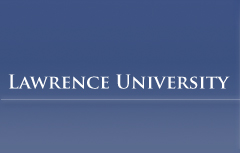Document Type
Press Release
Publication Date
2-1-2011
Abstract
Curator, author and educator Mary Jane Jacob discusses the changing dynamics of public art Tuesday, Feb. 8 in an address at Lawrence University.
Jacob, an independent curator and executive director of exhibitions at the School of the Art Institute of Chicago, presents “The Collective Creative Process” at 11:10 a.m. in the Lawrence Memorial Chapel, 510 E. College Ave., Appleton. Jacob also will conduct a question-and-answer session at 2 p.m. in the Warch Campus Center cinema.
Both presentations, part of Lawrence’s 2010-2011 convocation series, are free and open to the public.
A former chief curator at both the Museum of Contemporary Art in Chicago and later with the Museum of Contemporary Art in Los Angeles, Jacob has established herself as one of the country’s leaders in exploring art outside the museum context.
Starting with the Spoleto Festival USA in Charleston, S.C., Jacob has developed numerous experimental public art programs, including “Culture in Action,” a two-year project (1991-93) during which artists worked in direct partnership with community members to explore the changing nature of public art, its relationship to social issues and an expanded role of audience from spectator to participant. The project provided a new model for art in the urban context.
In 2000, Jacob co-organized a multi-year consortium effort — “Awake: Art, Buddhism and the Dimensions of Consciousness” — that engaged 50 museum and other arts professionals. Based in the San Francisco Bay Area, “Awake” explored the relationships between Buddhist practices and the arts in America and the intersection of the mind in creativity, meditation and perception of art. It led to numerous exhibitions, performances, and public programs across the U.S.
As executive director of exhibitions at the School of the Art Institute of Chicago, Jacob is currently involved in the program “Living Modern Chicago.” Highlighting the program is the exhibition “Learning Modern” that uses the city as a living laboratory. It bridges the historic roots of American modernism in Chicago and its critical role in education in the mid-20th century while linking to the contemporary critical practices of artists, architects and designers.
Jacob earned a bachelor of fine arts degree from the University of Florida and a master’s degree in history of art and museum studies from the University of Michigan. She has been awarded fellowships by the National Endowment for the Humanities, the National Endowment for the Arts, and the Rockefeller Foundation, among others.
Recommended Citation
Lawrence University, "Curator, Public Art Advocate Mary Jane Jacob Delivers Lawrence University Convocation" (2011). Press Releases. 440.
https://lux.lawrence.edu/pressreleases/440
